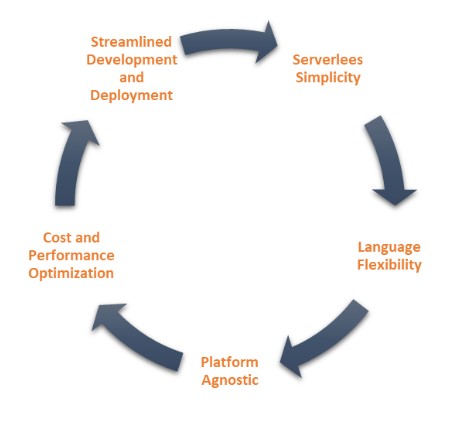Introduction
In today’s digitally connected world, we already have seen how the demand for cloud computing has skyrocketed. Businesses of all sizes are benefiting from the cloud to streamline their operations as well as enhance their services. There are many cloud service providers, and one of the leading cloud computing platforms you might have heard of is Microsoft Azure. It offers a wide range of services in order to build, deploy, and manage applications. Among these services, one of the offerings is Azure Functions, which has gained popularity in recent years. In this blog, you will get to understand What is azure functions, why, and when to use these functions, and their benefits.
Looking to dive deeper into Microsoft Azure? Consider taking the Microsoft AZ-900 and AZ-104 Combo Training. This comprehensive training program will equip you with the foundational knowledge (AZ-900) of cloud concepts, core Azure services, and management tools. Following that, you can progress to the AZ-104 which focuses on the skills and knowledge needed to administer a variety of infrastructure, security, and network solutions in the Azure cloud.
Before getting into more details, you must first understand “What is Azure Functions.”
What is Azure Functions?
Azure Functions is a serverless computing service with which developers can run small code snippets or functions in response to events. Events include changes to a database, messages from a message queue, or HTTP requests. The code is executed on demand, and Azure manages the underlying infrastructure. It is a fully managed service that allows developers to write and deploy code in a variety of programming languages, such as C#, F#, Node.js, Python, and Go.
Azure Functions provides a flexible and scalable way to build event-driven applications. It also integrates with many other Azure services. These services include Azure Storage, Azure Cosmos DB, and Azure Service Bus. This will provide a compressive platform for building cloud-based platforms.
Let’s now discuss the benefits of using it.
Benefits of Azure Functions
It offer a wide range of benefits that make it a good choice among developers. Some of the benefits of using Azure Functions are:

Serverless Simplicity
Azure Functions solely take care of underlying infrastructure. This allows you to focus only on writing and deploying the code. This serverless approach simplifies the development as well as the deployment process. Now, you no longer need to worry about provisioning and managing servers. Also, configuring software and scaling your application is easy too.
Language Flexibility
It supports a wide range of programming languages such as C#, JavaScript, Python, F#, PowerShell, and many more. This feature gives you the freedom to choose the best-suited tool for the job. This versatility ensures that your team can work with the technologies they are most comfortable with, improving productivity and code quality.
Platform Agnostic
It is a platform-agnostic service. What does it mean? This means that you can run your functions on any operating system, including Windows, Linux, and MacOS. With this cross-platform compatibility, you can seamlessly integrate it into your existing development workflows.
Cost and Performance Optimization
The best benefit of Azure Functions is that you can pay only for the resources you consume. This model is totally based on the execution time and memory usage of your functions. This model can lead to significant cost savings, as you are not paying for idle resources or provisioning capacity. Additionally, it automatically scales your application to meet demand, ensuring optimal performance without the need for manual intervention.
Streamlined Development and Deployment
It simplifies the development and deployment process by providing a range of tools and features to build, test, and deploy your serverless applications. This includes integration with popular development tools like Visual Studio Code, support for CI/CD pipelines, and the ability to monitor and debug your functions.
Now, you must be wondering where to use Azure Functions. Below, we have explained for your better understanding.
Use Cases for Azure Functions
Some of the use cases of Azure Functions are:
- Scheduled Tasks: It can be triggered by a timer, making it an excellent choice for running scheduled tasks, such as database cleanup, data processing, or sending periodic reports.
- Lightweight Web API: Azure Functions can also be used to create event-driven web APIs that handle HTTP requests, respond with data, or perform specific actions.
- Sending Background Emails: It can be used to send emails in the background without impacting the main application’s performance.
- Running Background Backup Tasks: It can be used to run backup tasks, such as database backups or file synchronization, in the background.
- Doing Backend Calculations: It can be used to perform complex calculations or data processing tasks in the background, without affecting the main application’s user experience.
These are the use cases of Azure Functions.
Frequently Asked Questions
Q1 – What is Azure Functions?
Azure Functions is a serverless cloud computing service by Microsoft that allows you to run event-driven code without provisioning or managing infrastructure. It continually offers updated infrastructure as well as resources that are needed to run your apps.
Q2 – What are examples of Azure Functions?
Examples of Azure Functions include sending notifications, validating forms, image processing, and integrating with APIs.
Q3 – What is the role for Azure Function?
Azure Functions play a crucial role in automating tasks, processing events, and integrating systems, acting as a glue between services.
Q4 – What is the difference between logic apps and Azure Functions?
Logic Apps orchestrate workflows and integrate systems, while Azure Functions execute specific code snippets in response to events. These functions focus on computing tasks rather than workflows.
Conclusion
Azure Functions is a powerful and versatile serverless cloud computing service that offers a wide range of benefits to developers. Whether you are building a real-time data processing application, integrating with APIs, running background tasks, or scheduling tasks, it is a great choice. Its serverless simplicity, language flexibility, cost and performance optimization, and streamlined development and deployment process make it an attractive choice for developers.
If you want to master the use of Azure Functions and many other concepts, you can enrol in Microsoft Azure AZ 900 Course and Microsoft Azure AZ 104 Course. If you have any more queries, feel free to use the comment section below.





